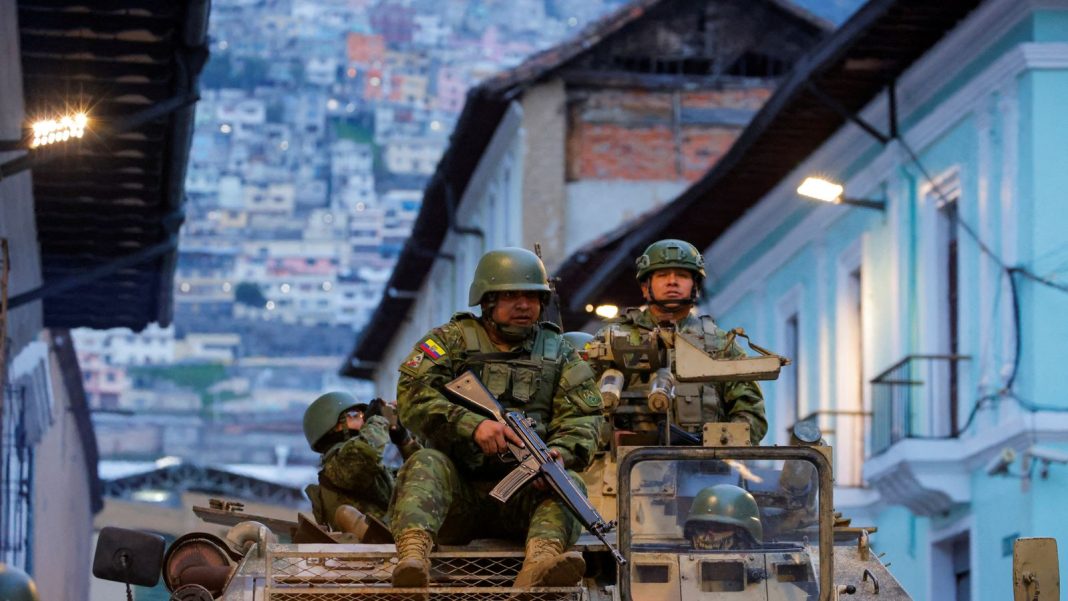The brazen spectacle of hooded gunmen bursting onto a live TV set – as chaos rules in the country’s prisons – has once again thrown Ecuador’s security crisis into the spotlight.
The South American nation is coming off its bloodiest year on record and grappling with warring drug gangs that are vying for power.
New president Daniel Noboa has vowed to eradicate violence with his so-called Phoenix Plan, the details of which haven’t been revealed to the public.
As Ecuador’s 17 million people now find themselves under a curfew enforced by armed soldiers, Sky News looks at what’s driving the violence and what is being done about it.
What is happening in Ecuador at the moment?
A state of emergency was declared in Ecuador on Monday in response to violence in the country’s notorious prisons – and the escape of an infamous gang leader.
Adolfo Macias – also known as Fito – was first reported missing from his cell on Sunday – the day he was expected to be transferred to a maximum security facility.
Two prison guards have been charged as prosecutors investigate how the convicted murderer got free.
Where is Adolfo Macias? Pic: Ecuadorean Armed Forces
Macias is the leader of the Los Choneros gang and was serving a 34-year sentence for drug trafficking and murder.
Meanwhile, about 150 prison guards and staff were taken hostage by prisoners in incidents in at least six jails.
By Tuesday, violence had spread to the streets, with seven police officers kidnapped in incidents around the country and five explosions confirmed in several cities.
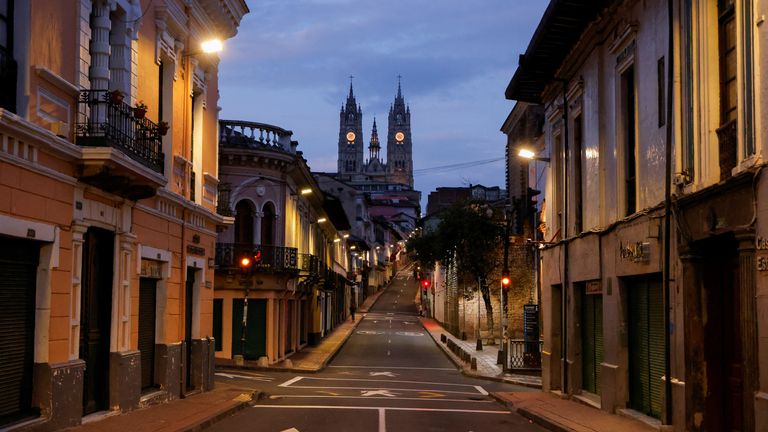
A deserted street as Ecuador’s population lives under curfew
What does the state of emergency mean?
President Noboa declared a 60-day state of emergency on Monday. This enables military patrols, including in prisons, and sets a national nighttime curfew.
Police and armed forces have been tasked with enforcing compliance with the new rules.
The state of emergency also restricts the rights to move freely, to assemble and allows police entry into homes without a court order.
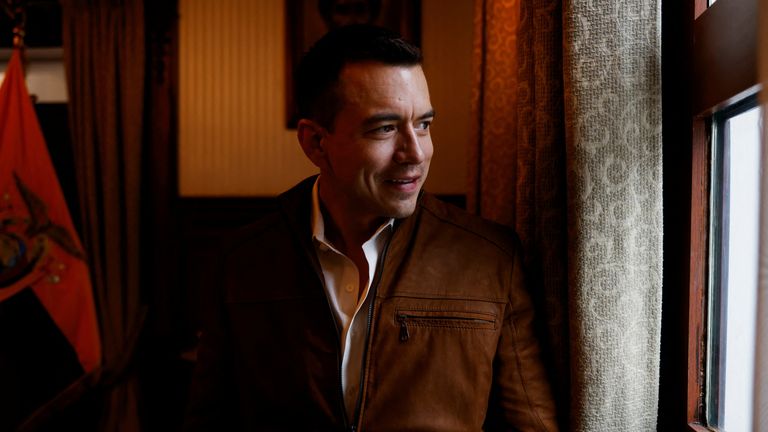
Ecuador’s President Daniel Noboa
The attack on a television centre, in which gunman were seen on live TV broadcast telling staff to lie down on the floor amid the sound of possible gunshots, prompted another decree.
President Noboa recognised an “internal armed conflict” and identified nearly two dozen gangs as terrorist groups, including Los Choneros, making them military targets and ordering the military to neutralise them.
Mr Noboa says he will confront crime inside prisons and will not stop until he “brings back peace to all Ecuadorians”.
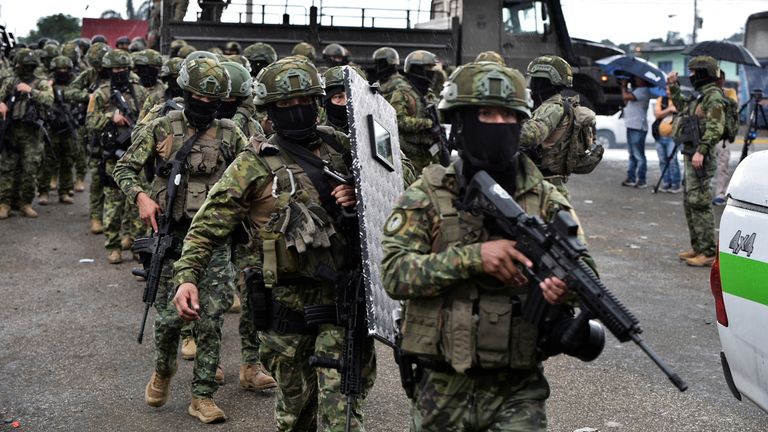
Ecuadorian soldiers arrive at the Zonal 8 prison for an inspection
Who are Los Choneros and how did their leader Adolfo Macias escape?
It’s not yet known exactly how Macias escaped – or where he is now.
In 2013, he fled a maximum security prison but was recaptured a few weeks later. Police are investigating whether his most recent escape mirrors his one from a decade ago.
Even from within prison, Macias was believed to have been able to exert his influence over the gang, including control of drug trafficking routes and territory.
Los Choneros is one of Ecuador’s most notorious drug gangs and is involved in much of the country’s cocaine trade.
Please use Chrome browser for a more accessible video player
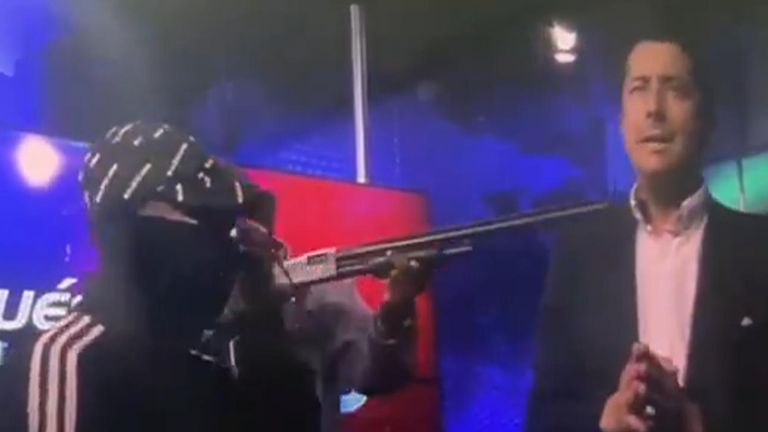
1:51
Hooded gunmen storm live TV set
The gang’s power in the drug world grew after the demobilisation of the Revolutionary Armed Forces of Colombia (FARC) group left a power vacancy.
But when its former leader Jorge Luis Zambrano, known as Rasquina, was assassinated in 2020 it destabilised the situation.
Will Freeman, a political scientist at the Council on Foreign Relations thinktank, told Sky News previously: “When he was taken out there began to be more intense fighting between Los Choneros and their rivals, and also within Los Choneros among mid-level commanders for control of the organisation – fighting which continues to this day.”
The authorities say Los Choneros has links to Mexico’s Sinaloa cartel and are one of the groups responsible for the recent spike in violence.
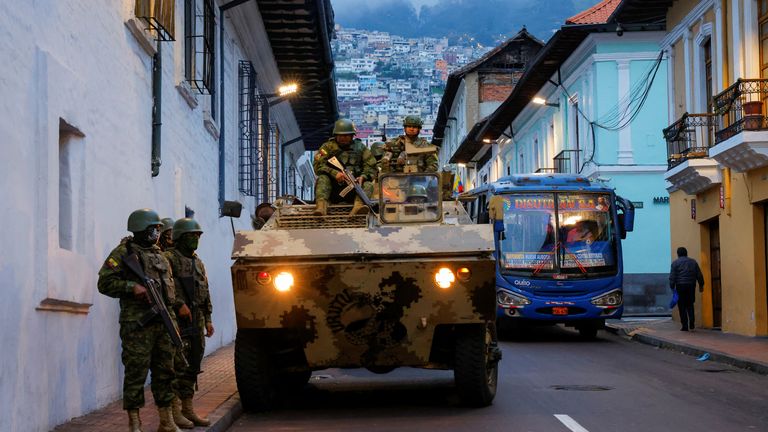
Read more:
British businessman rescued by police after kidnapping in Ecuador
Police investigating potential cartel massacre
Why has violence increased over the past few years?
Security in Ecuador has been worsening since the coronavirus pandemic, which also brutally battered the economy.
In 2023 there were 8,008 violent deaths nationwide, the government says, nearly double the figure of around 4,500 the year before.
The government blames the situation on the growing reach of cocaine trafficking gangs, who have destabilised swathes of the continent.
Violence peaked with the assassination of anti-corruption presidential candidate Fernando Villavicencio.
Inside Ecuador’s prison system, gangs have taken advantage of the state’s weak control to expand their power.
Prison violence has become increasingly common with gangs reportedly battling each other to control the jails.


